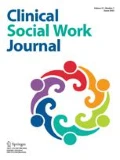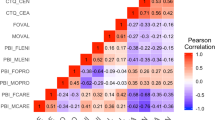Abstract
This paper argues that dominant narcissistic tendencies may keep certain non-custodial fathers from maintaining stable relationships with their children after divorce. It identifies the common characteristics and behaviors of the narcissistic non-custodial father to show the special difficulties he faces in the divorce process. Its main contention, made on the basis of the literature and with the help of two case descriptions, is that divorce and loss of custody pose a special threat to the narcissist's weak self and that the narcissistic father's post-divorce litigation and disengagement both stem from his driving need to maintain the “grandiose self” that protects his vulnerable and fragile core. Furthermore, the paper suggests that the family therapy framework cannot meet the needs of the narcissistic non-custodial father in the post divorce period. It urges that family care professionals be taught to recognize the common behaviors of narcissistic non-custodial fathers in relation to both their children and the helping professionals they consult and be made aware of the strong counter-transference feelings that such clients may evoke in them. It argues, too, that the focus of the treatment be moved to the mother and, especially, the children.
Similar content being viewed by others
REFERENCES
Ahrons, C.R., & Miller, R.B. (1993). The effect of the postdivorce relationship on parental involvement: a longitudial analysis. American Journal of Orthopsychiatry, 63, 441–450.
Akhtar, S. (1992). Narcissistic personality disorder, in: Broken structures: Severe personality disorders and their treatment. Northvale, New Jersey, Jason Aronson.
Amato, P.R. (1993). Children's adjustment to Divorce: Theories, hypotheses and empirical support. Journal of Marriage and Family, 55, 23–38.
Bach, S. (1977). On narcisstic fantasies. International Review of Psychoanalysis, 4, 281–290.
Baker, H.S. & Baker, M.N. (1987). Heinz Kohut's Self psychology: An Overview. The American Journal of Psychiatry, 144, 1–9.
Braverman, S. (1995). The integration of individual and family therapy. Contemporary Family Therapy, 17, 291–305.
Broembsen, F.V. (1988). The instrumental and the focal child: Two patterns of parent-dynamics in separation-impeding families. The American Journal of Orthopsychiatry, 48, 271–279.
Cohen, O. (1992). The single-parent family: Concept of sex role, ways of coping and sense of well being of divorced fathers and mothers raising their children themselves. (Hebrew text). Unpublished doctoral dissertation. Bar Ilan University, Ramat Gan, Israel.
Cunter-Smith, M.E. (1995). Assessing children's visitation needs with divorced noncustodial fathers. Families in Society, 45, 341–348.
DSM-IV (1994). Diagnostic and Statistical Manual of Mental Disorders. American Psychiatric Association, Washington, D.C.
Elkin, D. (1991). Instrumental narcissism in parents. Bulletin of the Menninger Clinic, 55, 299–307.
Freud, S. (1914). On narcissism: An introduction. Stanford Ed, 14, 69–102, London: Hogarth Press, 1975.
Horowits, M.J. (1975). Sliding Meanings: A defense against threat in Narcissistic Personalities. International Journal of Psychoanalytic Psychotherapy, 7, 167–180.
Kerenberg, O. (1975). Borderline condition and pathological narcissism. New York: Jason Aronson.
Kerenberg, O.F. (1984). Severe personality disorders: Psychotherapeutic strategies. Yale University, 179–226.
Kohut, H. (1968). The psychoanalytic treatment of narcissistic personalities disorders. The Psychoanalytic Study of the Child, 23, 86–113.
Kohut, H. (1971). The analysis of the self. New York: International Universities Press.
Kohut, H. (1972). Thoughts on narcissistic and narcissistic rage. In: The Search of the Self. Vol. 2, ed. P.H. Orenstein, New York: University Press, (1978). 615–659.
Kohut, H. & Wolf, E.S. (1978). The disorder of the self and their treatment. International Journal of Psycho-Analysis. 59, 413–425.
Kruk, E. (1991). Discontinuity between pre and post divorce father child relationship: new evidence regarding parental disengagement. Journal of Divorce & Remarriage, 16, 195–227.
Kruk, E. (1992). Psychological and structural factors contributing to the disengagement of noncustodial fathers after divorce. Family and Conciliation Courts Review, 30, 81–101.
Kruk, E. (1994). The disengaged noncustodial father: Implications for social work practice with divorced family. Social Work, 39, 15–24.
Palombo, J. (1976). Theories of narcissism and the practice of clinical social work. Clinical Social Work, 4, 147–161.
Manninen, V. (1993). For the sake of eternity: On the narcissism of fatherhood and the father-son relationship. Scandinavian Psychoanalytic Review, 16, 35–46.
Mayer, E.R. (1986). Deprivation in the early mother-daughter relationship. Journal of Contemporary Psychotherapy, 16, 120–139.
Miller, A. (1981). The drama of the gifted child. New York: Ungar.
Modell, A.H. (1975). A narcissistic defense against affects and the illusion of self-sufficiency. International Journal of Psychoanalysis, 56, 275–282.
Pinsof, W.M. & Wynne, L.C. (1994). The efficacy of marital and family therapy: An empirical overview, conclusions and recommendations. Journal of Marital and Family Therapy, 21, 585–613.
Raskin, R., Novaceck, J. & Hogan, R. (1991). Narcissistic self esteem management. Journal of Personality and Social Psychology, 60, 911–918.
Stephen, E.H., Freedman, V. & Hess, J. (1993). “Near and far: Contact of children with their non-custodial fathers”. Journal of Divorce and Marriage, 20, 171–189.
Tolpin, M., & Kohut, H. (1980). The disorder of the self: The psychopathology of the first years of life. In: S.I. Greenspan, & G.H. Pollack, The course of life: Psychoanalytic contributions. Toward understanding personality development. (pp. 425–443). Washington, D.C.: NIMH.
Umberson, D., Williams, C.L. (1993). Divorced fathers—Parental role strain and psychological distress. Journal of Family Issues, 14, 378–400.
Volkan, V.D. (1973). Transitional fantasies in the analysis of a narcissistic personality. Journal of American Psychoanalytic Assessment, 21, 351–356.
Wall, J.C. (1992). Maintaining the connection: Parenting as non-custodial father. Child and Adolescent Social Work Journal, 9, 444–456.
Wallerstein, J.S. & Blakeslee, B. (1989). Second chances: Men women and children a decade after divorce. New York: Ticknor & Fields.
Wallerstein, J.S. (1990). Transference and countertransference in clinical intervention with divorcing families. American Journal of Orthopsychiatry, 60, 337–345.
Wallerstein, J.S. (1991). The long-term effects of divorce on children: A Review. Journal of the American Academy of Child and Adolescent Psychiatry, 30, 349–360.
Watson, P.J., Tracy, L. & Biderman, M. (1992). Narcissism and parenting styles. Psychoanalytic Psychology, 9, 231–244.
Wylder, J. (1982). Including the divorced father in family therapy. Social Work, 27, 479–482.
Author information
Authors and Affiliations
Rights and permissions
About this article
Cite this article
Cohen, O. Parental Narcissism and the Disengagement of the Non-Custodial Father After Divorce. Clinical Social Work Journal 26, 195–215 (1998). https://doi.org/10.1023/A:1022823102590
Issue Date:
DOI: https://doi.org/10.1023/A:1022823102590




